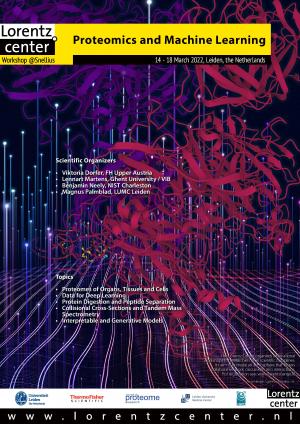Proteomics and Machine Learning is an explosive combination. Explosive in the sense of rapidly expanding and with far-reaching impact. This became evident in a Lorentz Center Workshop on the topic held in Leiden March 14-18, 2022, co-organized with Viktoria Dorfer, Lennart Martens and Benjamin Neely.
 Poster announcing the Lorentz Center workshop on Proteomics and Machine Learning
Poster announcing the Lorentz Center workshop on Proteomics and Machine Learning
Machine Learning plays an increasingly important role in data intensive sciences such as proteomics. The workshop focused on models predicting experimental proteomics data to address important needs in experimental design, quality control and algorithm benchmarking. As any powerful technology has the potential for misuse, risks and risk mitigation were discussed in depth, with great talks by Elisabeth Bik and Samuel Payne on detecting fabricated data, including in proteomics.
The workshop was designed to bring participants with different expertise in proteomics and/or ML, present the state-of-the-art and identify challenges and opportunities in application of ML in mass spectrometry-based proteomics. Introductory keynotes covering ML in each step of a proteomics experiment were combined with thematic breakouts and hackathons to achieve these goals.
Overall, the workshop was a resounding success. Bringing together experts from each aspect of ML and proteomics fostered communication in a unique and powerful setting. We began the week investigating whether certain topics and applications were theoretically possible, and left the workshop having demonstrated that these concepts were in fact possible, or identified concrete steps to their realization. The outputs of this workshop will undoubtedly accelerate the adoption and advancement of ML in proteomics.
